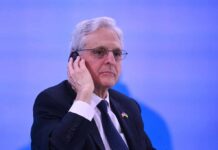
On Friday, President Joe Biden visited Las Vegas to announce his commitment to advancing high-speed rail. While he was there, he took the opportunity to criticize Donald Trump as an ineffective politician.
At an event for unionized carpenters, Biden said, “Trump just talks the talk. We walk the walk. He likes to say America is a failing nation. Frankly, he doesn’t know what the hell he’s talking about. I see shovels in the ground, cranes in the sky, people hard at work rebuilding America together.”
During the event, Biden highlighted $8.2 billion in fresh federal funding for ten significant passenger rail projects nationwide. Additionally, he underscored the fundamental distinctions between himself and Trump.
Biden asserted that Trump “failed” in fulfilling his commitments to invest in U.S. infrastructure and argued that his rail funding could facilitate the connection between Las Vegas and Los Angeles through high-speed trains before the 2028 summer Olympics.
Biden anticipates that investments via federal and state partnership initiatives will enhance the prospects of the long-debated project. Supporters believe it could rejuvenate travel in the American West, while critics argue that it is overly expensive.
The potential train route spanning 218 miles from Las Vegas to Rancho Cucamonga, California, approximately 40 miles east of downtown Los Angeles, could eventually cater to over 11 million passengers annually.
The Biden administration announced its investment of over $3 billion for California's ongoing high-speed rail project.https://t.co/d2GZcBolyu
— FOX40 News (@FOX40) December 9, 2023
The funds proposed by the president will fall far short of covering the complete expenses for the project. Nonetheless, they signify the Biden administration’s dedication to promoting train travel.
Additional railway initiatives receiving funding include enhancements to frequently traveled routes in Virginia and North Carolina. The goal is to eventually connect Richmond and Raleigh by rail.
The funds will also support upgrades to a rail bridge over the Potomac River to enhance passenger service in Washington and cover improvements to train corridors in western Pennsylvania and Maine. There will also be an expansion at Chicago’s Union Station, one of the busiest rail hubs in the nation.
The funding for the plan is sourced from previous federal grants, a bond fund endorsed by voters in 2008 and revenue generated from the cap-and-trade climate program. However, the cumulative amount falls significantly short of the project’s estimated costs, which currently exceed $100 billion.
While California Republicans have consistently criticized the initiative, even certain state Democrats have grown more outspoken in their skepticism.
































